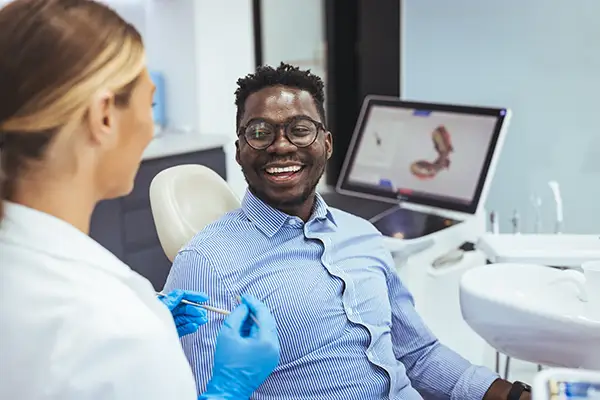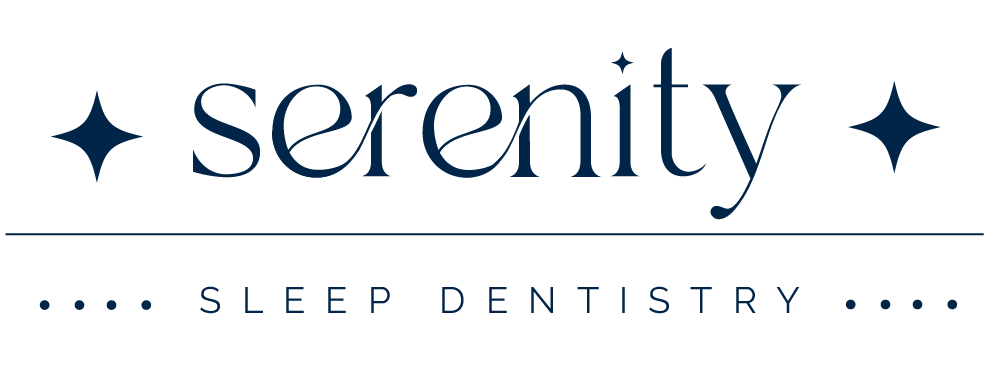Sedation Dentistry for PTSD Patients
 For individuals living with post-traumatic stress disorder (PTSD), dental visits can be a significant source of anxiety. The clinical environment, physical proximity, and sensory stimuli often associated with dental care can trigger distressing memories. At Serenity Sleep Dentistry, we offer sedation dentistry for PTSD patients, providing a compassionate and trauma-informed approach to ensure a comfortable and safe dental experience. For individuals living with post-traumatic stress disorder (PTSD), dental visits can be a significant source of anxiety. The clinical environment, physical proximity, and sensory stimuli often associated with dental care can trigger distressing memories. At Serenity Sleep Dentistry, we offer sedation dentistry for PTSD patients, providing a compassionate and trauma-informed approach to ensure a comfortable and safe dental experience.
Understanding PTSD and Dental Anxiety
Post-traumatic stress disorder (PTSD) is a mental health condition triggered by experiencing or witnessing a traumatic event. Symptoms can include flashbacks, severe anxiety, and avoidance behaviors. Dental settings can inadvertently evoke these responses due to:
| • |
Sensory Triggers - Sounds of dental instruments, the scent of antiseptics, and the sensation of reclining can mirror aspects of past traumas.
|
| • |
Loss of Control - Being in a vulnerable position during dental procedures can heighten feelings of helplessness.
|
| • |
Physical Proximity - Close contact with dental professionals may be uncomfortable for those with personal space sensitivities. |
These factors can lead to dental avoidance, exacerbating oral health issues. Recognizing and addressing these challenges is crucial for providing effective care.
What Is Sedation Dentistry?
Sedation dentistry involves the use of medication to help patients relax during dental procedures. It's particularly beneficial for individuals with PTSD, as it can alleviate anxiety and create a more tolerable experience. Common sedation methods include:
| • |
Nitrous Oxide (Laughing Gas) - Inhaled through a mask, it induces a state of relaxation while keeping the patient conscious.
|
| • |
Oral Sedatives - Taken in pill form prior to the appointment, these medications reduce anxiety and may cause drowsiness.
|
| • |
Intravenous (IV) Sedation - Administered through a vein, allowing for deeper sedation levels and quick adjustment of dosage. |
These options are administered under strict medical supervision, ensuring safety and efficacy for patients with mental health considerations.
Trauma-Informed Dental Care Principles
At Serenity Sleep Dentistry, we adhere to trauma-informed care principles, recognizing the widespread impact of trauma and integrating this understanding into our practice. Key elements include:
| • |
Safety - Creating a secure environment where patients feel protected.
|
| • |
Trustworthiness - Maintaining transparency in procedures and decisions.
|
| • |
Empowerment - Encouraging patient autonomy and participation in their care.
|
| • |
Collaboration - Building partnerships between patients and providers.
|
| • |
Cultural Sensitivity - Respecting diverse backgrounds and experiences. |
Implementing these principles involves:
| • |
Clear Communication - Explaining procedures and obtaining consent at each step.
|
| • |
Environment Modification - Adjusting lighting, sounds, and scents to minimize triggers.
|
| • |
Personalized Care - Tailoring approaches based on individual histories and comfort levels. |
This approach fosters a supportive atmosphere conducive to healing and trust.
How We Support PTSD Patients in Our Office
Our commitment to gentle dental care for PTSD patients encompasses:
| • |
Customized Treatment Plans - Developing strategies aligned with each patient's unique needs and trauma history.
|
| • |
Pre-Visit Consultations - Offering meetings to discuss concerns and establish rapport before any procedures.
|
| • |
Flexible Scheduling - Allowing extra time for appointments to avoid rushing and accommodate breaks.
|
| • |
Comfort Measures - Providing options like noise-canceling headphones, weighted blankets, and the presence of a support person during treatment. |
By prioritizing patient comfort and autonomy, we aim to transform dental visits into positive experiences.
Ready to Take the First Step Toward Gentle Dental Care?
At Serenity Sleep Dentistry, we understand the complexities of dental anxiety and PTSD. Our team is dedicated to providing sedation dentistry for PTSD patients in a compassionate and understanding environment. We offer:
| • |
Insurance Guidance - Assisting with coverage questions and financial planning.
|
| • |
Convenient Hours - Flexible scheduling to accommodate diverse needs.
|
| • |
Accessible Location - Easily reachable office with a calming atmosphere. |
Let us partner with you on your journey to improved oral health and well-being.
FAQs
Is sedation dentistry safe for individuals with PTSD?
Yes, when administered by trained professionals, sedation dentistry is safe for individuals with PTSD. We conduct thorough assessments to determine the most appropriate sedation method, ensuring patient safety and comfort throughout the procedure.
Will I be unconscious during the procedure?
Sedation levels vary. With nitrous oxide and oral sedatives, patients remain conscious but relaxed. IV sedation can induce a deeper state of relaxation, and while patients may not be fully unconscious, they often have little to no memory of the procedure.
Can I have someone with me during the appointment?
Absolutely. We encourage patients to bring a trusted support person to their appointments. Their presence can provide additional comfort and reassurance during treatment.
How long does the sedation effect last?
The duration of sedation effects depends on the type used. Nitrous oxide wears off quickly, allowing patients to resume normal activities shortly after. Oral and IV sedatives may have longer-lasting effects, and patients should arrange for transportation and rest post-procedure.
|

 For individuals living with post-traumatic stress disorder (PTSD), dental visits can be a significant source of anxiety. The clinical environment, physical proximity, and sensory stimuli often associated with dental care can trigger distressing memories. At Serenity Sleep Dentistry, we offer sedation dentistry for PTSD patients, providing a compassionate and trauma-informed approach to ensure a comfortable and safe dental experience.
For individuals living with post-traumatic stress disorder (PTSD), dental visits can be a significant source of anxiety. The clinical environment, physical proximity, and sensory stimuli often associated with dental care can trigger distressing memories. At Serenity Sleep Dentistry, we offer sedation dentistry for PTSD patients, providing a compassionate and trauma-informed approach to ensure a comfortable and safe dental experience.